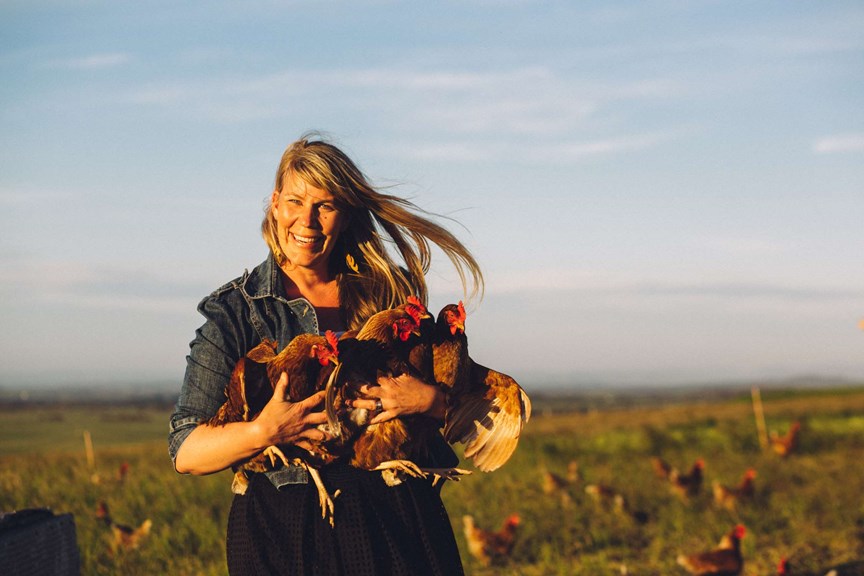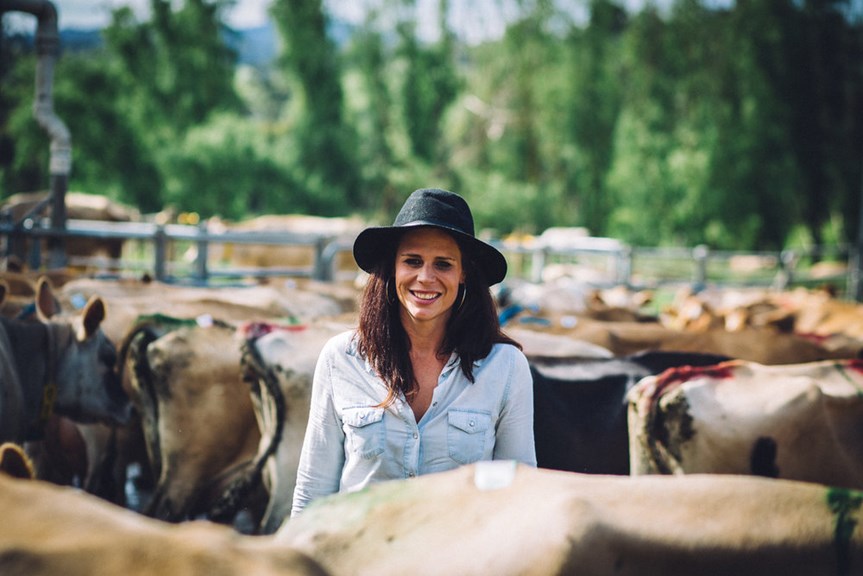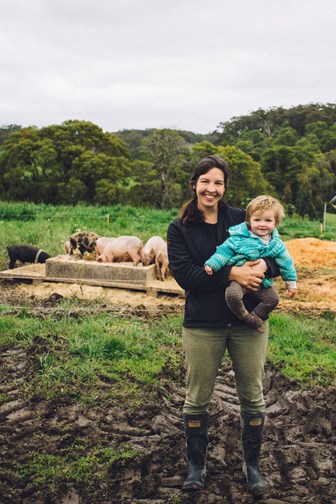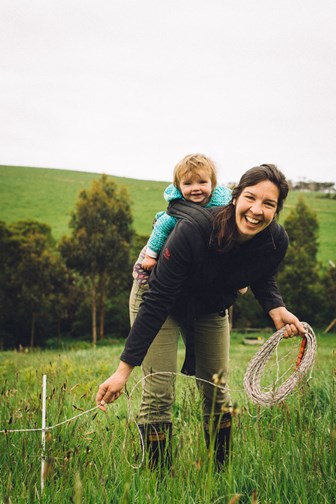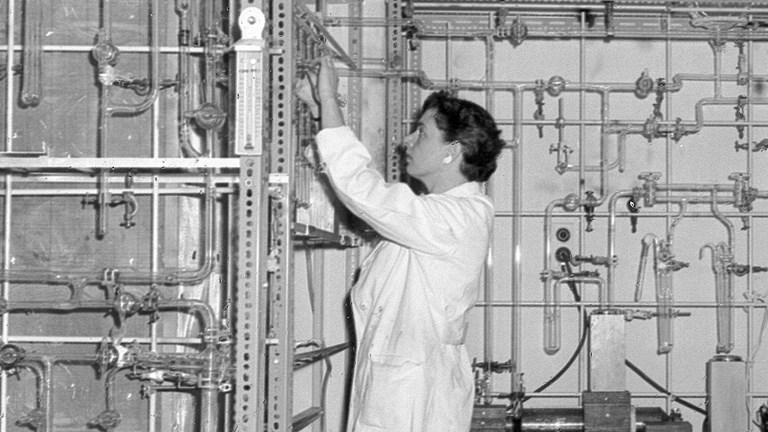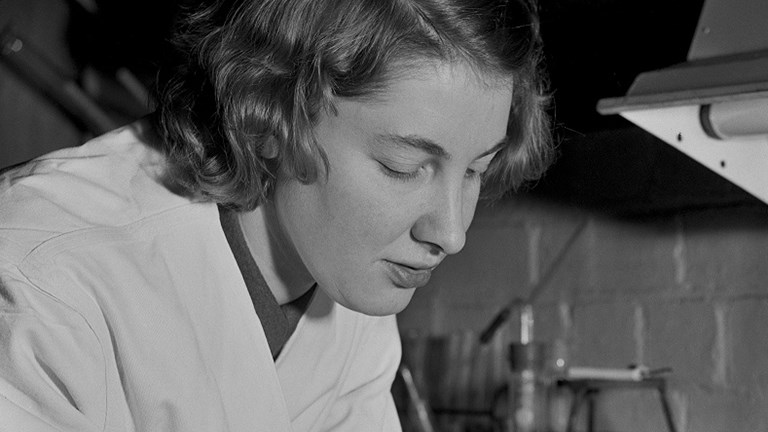Invisible Farmer
If you Google "Australian farmer" most of the images will be burly blokes, but those pictures tell only half the story.
Women produce 49% of the real farm income in Australia and their contribution is not new. Indigenous women have over 50,000 years of knowledge and experience in managing and caring for the land and colonial women were partners in Australian agricultural enterprises from the first days of settlement.
Today's female farmers are scientists and mothers, businesswomen and activists, as likely to be managing the sheep run as feeding the shearers.
Invisible Farmer is a research project that is revealing the hidden stories of Australian women farmers.
Anika Molesworth, 2015 Young Farmer of the Year, is one example. The 29-year old Broken Hill sheep farmer is experimenting with drones to monitor livestock on her property and studying for her PhD in agricultural climate science. She also works as a research assistant on a project in southern Laos to build crop-livestock systems.
Sallie Jones of Gippsland Jersey is a 36-year old dairy farmer passionate about improving mental health and suicide prevention in the rural community. Determined to honour the life of her father, whose life ended tragically during the 2016 dairy crisis, she is pioneering an ethos of “fairness and kindness” in the dairy industry.
Amelia Bright combines organic pork farming, running a sawmill and raising a toddler. Little Hazel spends her days helping paint logs at the saw mill to stop them splitting, emptying pig troughs and travels to farmers’ markets and butchers in a sling on her mother’s back.
"We'd really like her to grow up really capable and to see that both Mum and Dad can wield a hammer, and so can she, which she likes doing. She has complete choice over what direction her life is going to go in, and as long as she’s capable and can build those skills now, she continues to have choice," said Bright.
Invisible Farmer is the largest ever study of Australian women on the land. The three year project (2017-2019) is funded by the Australian Research Council and involves a nation-wide partnership between rural communities, academics, government and cultural organisations.
Museums Victoria is a lead partner in Invisible Farmer, working with ABC Rural, Department of Economic Development Jobs Transport and Resources, Monash University, National Library of Australia, National Foundation for Australian Women Limited, National Pioneer Women's Hall of Fame and University of Melbourne.
As a research project, Invisible Farmer has an important social role to uncover and create new histories of rural Australia. Researchers are learning about the diverse, innovative and vital role of women in agriculture.
The project aims to stimulate public discussions about contemporary issues facing rural Australia and its future and develop significant public collections that will enable far reaching outcomes in research, industry and public policy.
"Women are key agents of change and innovation and offer significant leadership in sustainability, food security, rural communities, natural disasters and policymaking. Making farm women's contributions visible is not just an exercise in recording and rewriting history, but also a critical step in securing Australia's future," said Liza Dale-Hallett, Senior Curator, Sustainable Futures at Museums Victoria and Lead Curator of Invisible Farmer.
Dale-Hallett said the research had important implications for future economic and environmental management.
"Failure to recognise the role that women play in Australian agriculture, food and fibre significantly limits the potential of half of Australia's workforce to effectively contribute to community life, policy, sustainability and our collective future both in Australia and worldwide.
Traditionally farm women's work has been excluded from official statistics and historical records, women were excluded from some agricultural colleges up until the 1970s and had no voting rights in farm organisations until the 1990s.
The 1980s-1990s saw the emergence of the Australian Rural Women's Movement. This movement led the world and involved the development of women's networks, organisations and groups that worked towards enabling farm women to network, campaign and gain more recognition.
1994 was a significant year of firsts for these women, hosting the first ever international conference of women in agriculture in Melbourne, and successfully lobbying the Australian Law Reform Commission to legally recognise women as ‘farmers’ for the first time in Australian history. This ground swell of activism became known as the Australian Rural Women’s Movement. Museums Victoria was part of this movement and worked closely with a number of remarkable women to document and display the untold and undervalued stories of women in agriculture.
Yet, 25 years later, they continue to be underrepresented in positions of rural leadership and decision making, and their contributions undervalued and overshadowed by the predominantly masculinist narrative of rural Australia.
Invisible Farmer continues the ground-breaking campaign started and led by Australian farm women. This project aspires to redefine 'farmer' and to empower farm women to share their experiences, and to take up their agency as significant contributors to rural enterprises and communities. It also aims to create new histories of rural Australia; reveal the hidden stories of women on the land; stimulate public discussions about contemporary issues facing rural Australia and its future; and develop significant public collections that will enable far reaching outcomes in research, industry and public policy.
